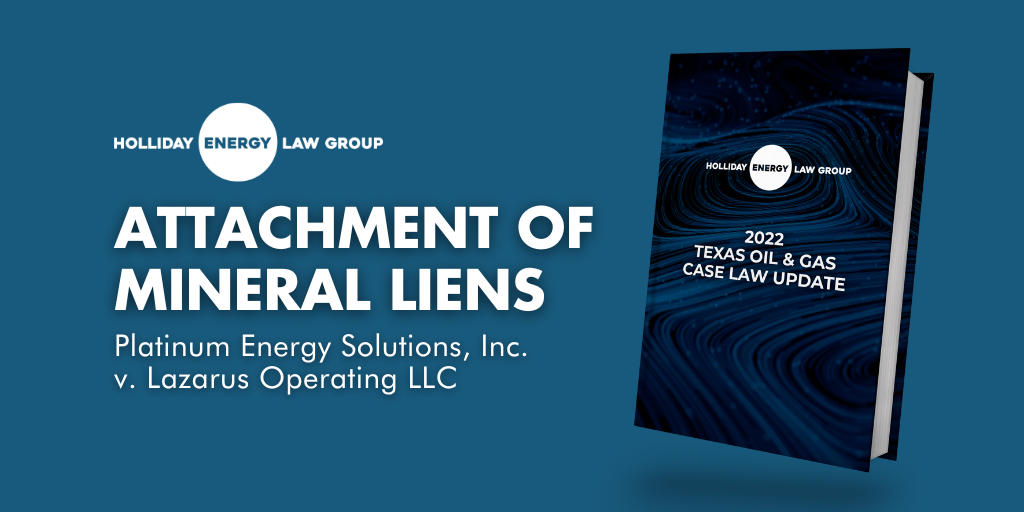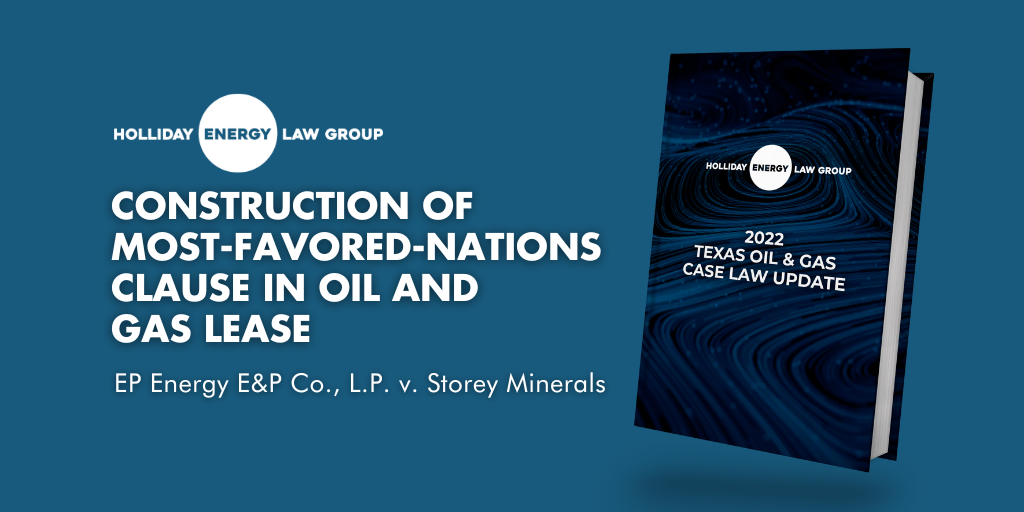Attachment of Mineral Liens

Platinum Energy Solutions, Inc. v. Lazarus Operating LLC, No. 13-20-00279-CV, 2022 WL 120151 (Tex. App.—Corpus Christi-Edinburg Jan. 13, 2022, no pet. h.). Attachment of Mineral Liens.
At issue in this case was whether a lien holding mineral contractor could foreclose on a ranch’s mineral estate. The court relied on Section 56.003 of the Texas Property Code, and distinguishing case law, to rule the lien never attached to the fee title of the property. Secondarily, the court overruled the lienholder’s unsupported claims and statute of limitations defense.
Key Takeaways
- The property interests of parties executing a mineral contract determine the extent of a mineral lien’s attachment.
- Similarly, a mineral lienholder does not have a proper foreclosure action against a property owner’s surface and mineral estate merely because its lien attached to the leasehold interest.
Origin of the Dispute
Three oil and gas wells are located on the Beeler family ranch in Leon County: the Ellis #1H, John Beeler #1H, and John Beeler #2. In December 2012, Platinum Energy Solutions (“Platinum”) contracted with Richland Resources Corporation (“Richland”), a working interest holder, to provide fracking services for the wells. Richland failed to pay three service invoices, totaling $5,419,320.64, which prompted Platinum to file mineral liens in Leon County. Platinum gave the Beelers prior notice in anticipation of their filing.
In June 2013, Platinum prepared to foreclose the liens and brought breach of contract and quantum meruit claims against Richland. However, in December 2013 Richland filed for bankruptcy, resulting in an automatic stay of Platinum’s foreclosure action. Years later, the bankruptcy court approved a settlement agreement which culminated in the Beelers terminating the lease in June 2016.
Subsequently, the Beelers leased all three wells to Lazarus Operating LLC (“Lazarus”). The new operator of Richland’s assets post-bankruptcy informed the Texas Railroad Commission of the change of responsibility. In December 2016, Platinum assigned its claims to Whitebox Credit Partners, L.P. (“Whitebox”).
Richland’s bankruptcy proceeding was closed by final decree in July 2017. After the final decree, Platinum maintained that no payments were received on its claim. It filed a supplemental petition in September 2018 that added Lazarus as additional defendant and Whitebox as plaintiff. The supplemental petition stated that the plaintiffs “learned that the property owners re-leased the affected wells/mineral interests, without regard to Platinum's valid liens attaching thereto.” In response, the Beelers intervened and filed a motion for summary judgment, which Lazarus adopted, and the trial court granted. The trial court ruled that the mineral estate was not subject to foreclosure under Platinum’s mineral lien.
Property Subject to Mineral Liens
On appeal, the court turned to Section 56.003 of the Texas Property Code to determine whether Platinum’s mineral liens attached beyond the leasehold. This specific code section identifies what property is subject to mineral liens.
(a) The following property is subject to the lien:
(1) the material, machinery, and supplies furnished or hauled by the lien claimant;
(2) the land, leasehold, oil or gas well, water well, oil or gas pipeline and its right-of-way, and lease for oil and gas purposes for which the labor was performed or material, machinery, or supplies were furnished or hauled, and the buildings and appurtenances on this property;
(3) other material, machinery, and supplies used for mineral activities and owned by the owner of the property listed in Subdivision (2); and
(4) other wells and pipelines used in operations related to oil, gas, and minerals and located on property listed in Subdivision (2).
(b) A lien created by performing labor or furnishing or hauling material, machinery, or supplies for a leaseholder does not attach to the fee title to the property.
In light of this, the appellate court addressed Platinum’s claims. Platinum argued that McCarty v. Halliburton Company made leasehold estates, oil wells, and equipment subject to mineral liens under Section 56.003. Platinum further relied on the holding in Flournoy Drilling Co. v. Walker that “mineral contractors and subcontractors may perfect a lien upon particular oil and gas properties, leaseholds, and materials and supplies provided for mineral activities.”
The court agreed with Platinum that mineral liens may attach to leaseholds but distinguished the facts in McCarty and Flournoy from Platinum’s facts. The court reiterated that the underlying contract was between Platinum and Richland, who had a working interest in the wells serviced by Platinum. Importantly, the Beelers, who owned the property, never contracted with Platinum. Under Section 56.003(b), Platinum’s lien was based in providing services to Richland, a leaseholder, thus the lien did not attach to the Beeler’s fee title.
The appellate court’s finding was supported by Bethlehem Supply Corp. v. Wotola Royalty Corp., which held that under Section 56.003, a mineral lien extends only to property of persons whose auspices the labor or material that was furnished and does not attach to property of third persons. Liens related to labor, supplies, and machinery provided to a leaseholder do not attach to underlying fee title in the land.
Secondly, the court dismissed Platinum’s unsupported argument that because their services benefitted the well and persons with an interest in its production, their mineral lien attached to the property. Again, the court asserted that as a mineral contractor, Platinum performed work for someone other than the property owner. Therefore. the mineral lien could not attach to fee title.
The court also overruled Platinum’s third argument – that the Beelers’ claims were barred by the statute of limitations and by the doctrine of laches. The appellate court found that the Beelers intervened in the lawsuit at the time Platinum raised the claim that the mineral lien attached to the Beelers’ property, which was at the time when an actual controversy arose between the parties.
Holding
The court of appeals affirmed the judgment of the trial court in favor of Lazarus Operating LLC and concluded Platinum’s mineral liens had attached only to the leasehold.
For a more detailed insight into the 2022 Texas Oil & Gas Case Law Update, download the HELG paper.

-1.png)
